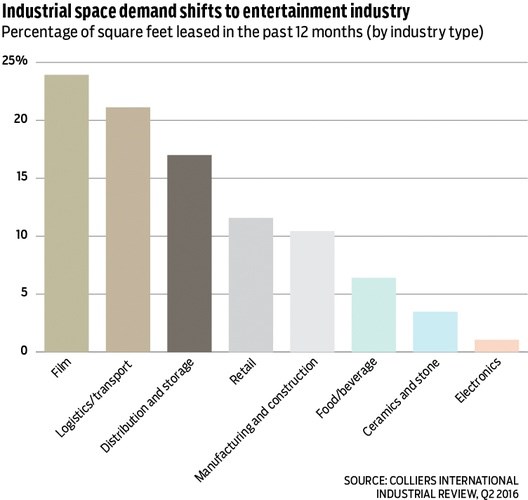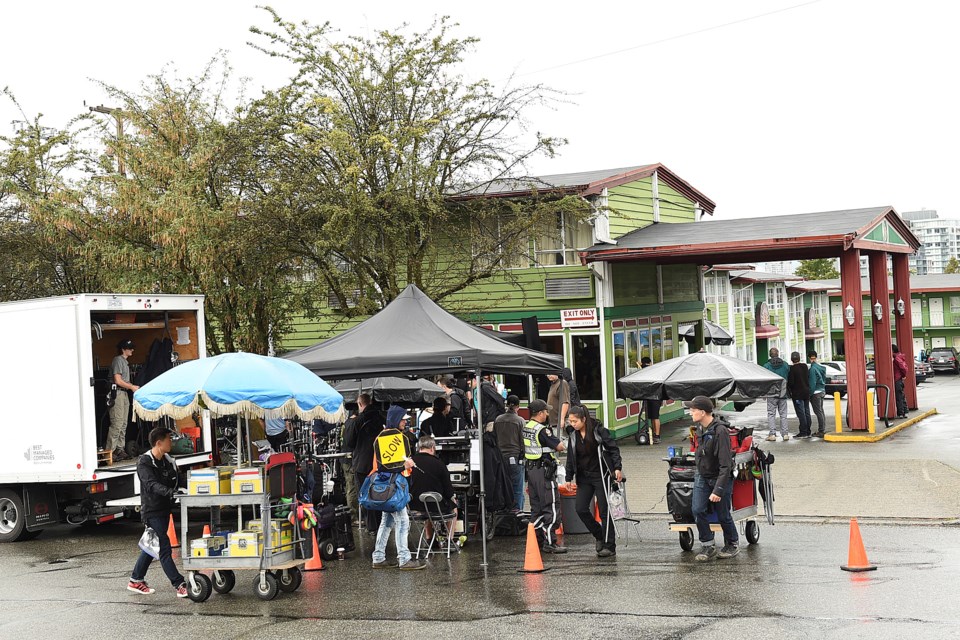Movie and TV producers have seized 28.9 per cent of all the industrial space leased in Metro Â鶹´«Ã½Ó³»in the past year, often outbidding traditional tenants to become the dominant player in a tight market.
The unprecedented demand from the billion-dollar B.C. film industry, which has leased 1.5 million square feet since mid-2015, has helped to drive the Metro industrial vacancy rate to a Canada low of 1.5 per cent, according to Sean Bagan, an industrial specialist with Colliers International in Vancouver.

âThey have completely changed our industry,â Bagan said, due to film producersâ demand for short leases and a willingness to pay above-market rates, which âhad previously never happened.â
Industrial tenants traditionally sign three-, five- or 10-year lease agreements, but Bagan said film shoots need studio space for only about six months. As a result, TV and film companies are paying full lease rates and up to $1 per square foot above that, and even signing two-year agreements to secure the space. They then either hold the site for a second shoot or attempt to sublease the space to another film company.
The film producers are scrambling for high ceiling heights in no-column open warehouses of at least 40,000 square feet with enough bay space to turn big trucks â the same type of modern buildings sought by the next biggest industrial tenants: retail/wholesale distributors and logistics/transport companies.
There is five million square feet of new industrial planned or under construction in Metro Vancouver, but Bagan doubts industrial developers, even those known for speculative plays, would purpose-build for the film industry. Landlords would not want to deal with continual rollovers, and Bagan noted that there is skepticism that the B.C. film industry will remain as active, even by next year.
The caution is understandable. B.C. film production values increased to $1.6 billion in fiscal 2014-15 compared with $1.1 billion in the previous fiscal year, with the incentive being fed by a lower Canadian dollar and a near doubling of provincial tax credits to the film industry to $493 million. Because they are refundable tax credits, film companies receive the credit even when they pay little or no tax to government. The largesse is considered a key component in attracting film productions. The latest provincial budget, however, laid out plans to âlimit the growth of film tax creditsâ across 2016-17 through to 2018-19.
However, film studios appear more confident in the future of B.C.âs movie industry than are industrial developers.
Vancouver-based Ironwood Studios has leased 177,000 square feet of space, gutting a warehouse and building seven stages, two workshops, office space and storage for its studio on Southeast Marine Drive near Fraser Street in Vancouver. In June, Ironwood also leased more than 40,000 square feet of industrial space in New Westminster, where it plans to sublet studios and office space to companies involved in the production of movies, TV shows and commercials.
Meanwhile, Hollywood studio Skydance Media has leased the former Pacific Press printing plant in Surrey and is converting it to studio space. Skydance, based out of Paramount Pictures in Los Angeles, and whose upcoming films include Star Trek Beyond and World War Z, is renovating the 220,000-square-foot industrial site into a five-stage sound studio for its film and television productions. For other film producers, the hunt remains intense for Â鶹´«Ã½Ó³»studio space, according to Mary Jo Beirnes, location manager for the TV series The Magicians, an NBC/Universal TV production being partly shot in a Â鶹´«Ã½Ó³»warehouse on Southwest Marine Drive.Â



